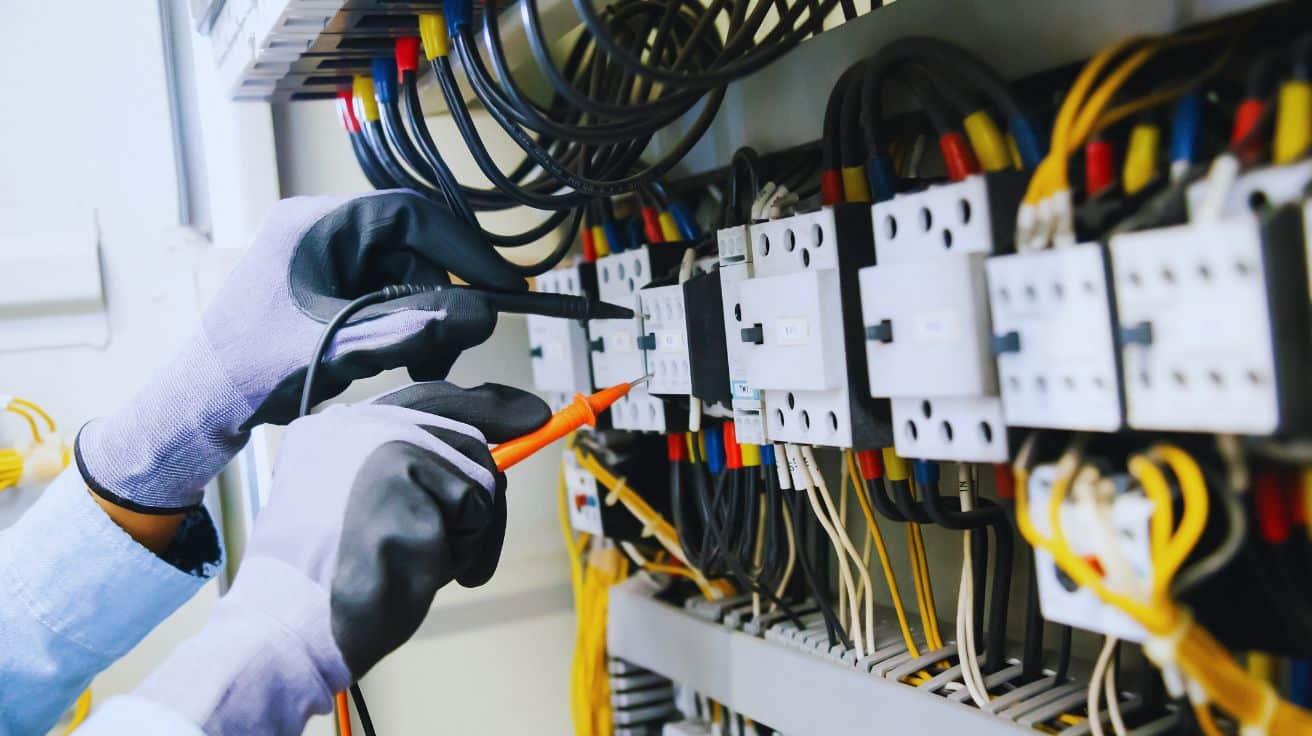Table of Contents

Dealing with electrical issues in your home can be stressful, especially if they have the potential to cause injuries, fires, or major property damage.
Unfortunately, some electrical problems inevitably arise that require immediate emergency repair by a professional electrician.
Leaving hazardous electrical issues unchecked puts your safety at risk.
We outline eight of the most common electrical emergencies below, along with tips on how to stay protected.
1. Detecting Electrical Fires
Electrical fires account for over 51,000 home fires per year in the US. Faulty electrical wiring and overloaded circuits are often the culprits.
Warning signs of an electrical fire include:
- A burning plastic smell from appliances or outlets
- Flickering lights or intermittent power
- Discolored or warm electrical panels or outlets
- Buzzing, cracking, sizzling sounds from outlets or appliances
If you suspect an electrical fire, evacuate the home immediately and call 911. Fires can spread rapidly, so early detection and emergency response are critical.
Once the fire department contains the initial fire, contact a certified master local electrician to assess the damage and perform rewiring repairs.
Finding one is straightforward – just do a simple online search for “electrician [your city] [your state]”.
For instance, if you live in Sarasota, Florida, you would search for “electrician Sarasota FL” to find certified electricians in your local area.
They’ll trace the electrical fault source of the fire and fix all hazardous wiring issues to prevent future electrical fires.
They will check that the amperage loads, surge protection, and electrical grounding meet current safety standards throughout your home’s electrical system.
Install smoke detectors on every level of your home for early fire and smoke detection.
Having an emergency action plan with escape routes in place facilitates rapid evacuation in electrical fire emergencies. Safety should remain the number one priority for your family.
2. Sparking Outlets or Appliances
Outlets or appliances that emit small electric sparks represent a dangerous fire hazard. Sparking is often caused by loose wiring connections.
Over time, sparks can ignite nearby combustible materials.
If you notice any sparking from outlets, switches, or appliances, refrain from using them and call an electrician right away.
The issue could signal outdated wiring that needs full replacement to meet modern electrical safety testing standards.
3. Blown Fuses or Tripped Breakers
Fuses and circuit breakers are designed to trip and shut off power to parts of your home when electrical flows exceed safe levels.
If you continually blow fuses or trip breakers, it likely signals a major underlying electrical issue.
Problems that can lead to blown fuses or tripped breakers include:
- Faulty wiring
- Overloaded or damaged circuits
- Ground faults
- Short circuits
- Appliance/electronics malfunctions
Don’t ignore or repeatedly reset tripped breakers, as it stresses your electrical system.
Contact a professional electrician to inspect your electrical panel, circuits, and appliances to locate and resolve the root cause – whether it’s outdated wiring, exceeded capacity, or appliance failure.
4. Strange Circuit Breaker Behavior
Circuit breakers that behave erratically likely have deeper issues. Warning signs include:
- Breakers that trip randomly without overloads
- Breakers that do not properly reset after tripping
- Breakers that feel warm or make buzzing/cracking noises
- Flickering lights when breakers trip and reset
Faulty breaker behavior points to deteriorating breakers, dangerous hot spots in the electrical system, arc faults, or failing wires.
Contact an electrician promptly to avoid fires or electrocution risks. They’ll fully examine your breaker panel and electrical infrastructure to fix all hazards.
5. Light Flickering and Dimming
Lights that constantly dim, brighten, or flicker often stem from problems with the electrical wiring that supplies the light fixtures.
Common culprits behind flickering lights include:
- Loose or damaged wiring connections
- Overloaded circuits
- Faulty breakers or outdated electrical panels
- Presence of high-resistance “hot” spots
Flickering indicates your home’s electrical flow is being disrupted. Without repairs, it often worsens over time. Persistent flickering can damage connected appliances too.
It’s recommended that you have an electrician regularly check your wiring to perform maintenance checks and pinpoint specific hazards causing the problem.
6. Power Surges
Power surges are unexpected rapid spikes in electrical flow often caused by electrical grid or weather-related issues. While your home may have surge protectors, older electrical systems lack the capacity to handle excess energy flows.
Signs of power surges include:
- Lights/outlets suddenly shutting off or tools powering down unexpectedly
- Circuit breakers randomly tripping
- Damage to appliances like scorched outlets or melted plugs
- Flickering lights as surges strain your electrical system
Contact an emergency electrician if surges persist or cause appliance damage.
They’ll check for wiring hazards and install whole home surge protection to guard against future surges entering your electrical network.
7. Odd Electrical Smells
Unusual burning smells emitting from your electrical panel, outlets, switches, or appliances likely indicate overheating electrical components or wiring.
If ignored, heat damage can destroy insulation and expose live wires to ignite fires.
Don’t disregard electrical burning smells – have an electrician identify the cause immediately.
Along with fire risks, electrical burning smells can signal potential electrocution hazards from exposed conductors.
Shut off affected circuits until an electrician resolves all urgent issues.
8. Buzzing/Cracking Sounds
Hearing buzzing, cracking, or sizzling noises from your electrical panel, outlets or appliances points to electrical arcing faults.
Arcing occurs when electricity erratically jumps between connections – generating extreme heat that damages wires and insulation.
Left uncorrected, arcing results in full wiring failure. It also frequently serves as a source of ignition for electrical fires.
Never ignore arcing hazards or unusual electrical noises. An electrician can promptly detect and extinguish them before catastrophic damage occurs.
Protect Yourself from Electrical Emergencies
While no electrical system is immune from occasional issues, there are ways to mitigate risks:
- Overload Protection: Use surge protectors and avoid overloading outlets with too many appliances.
- GFCI Outlets: Use ground-fault circuit interrupter outlets around wet areas like kitchens and bathrooms to prevent shocks.
- AFCI Breakers: Install arc-fault circuit interrupter breakers to halt dangerous electrical arcing if it occurs.
- Whole House Surge Protection: Protect your full electrical network against exterior surges.
- Regular Inspections: Schedule periodic inspections by hiring a licensed electrician for your home to catch minor electrical issues before they escalate into hazards or full-blown emergencies.
Final Thoughts
You can keep electrical risks low while enjoying uninterrupted power by combining preventative safety devices with regular maintenance.
Contact emergency electricians immediately whenever you encounter any persistent electrical hazard or outage. Prioritizing your safety comes first.







